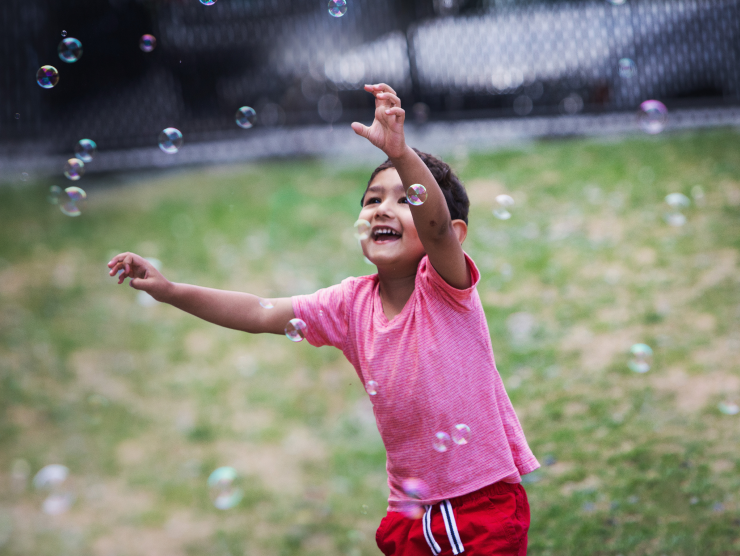Fine motor skills are the skills required to make movements using the muscles in our arms, wrists, hands, and fingers. As adults we use fine motor skills all the time. We all rely on them to accomplish countless tasks in school, at home, at work, and in our everyday lives, such as each time we get dressed, hold a utensil to eat, write or type, brush our teeth, etc.
How important are fine motor activities for preschoolers
Fine motor coordination is part of whole-body development for young children. Children begin to use, develop, and strengthen their fine motor skills as early as infancy, from the first moments of grasping a caregiver’s finger in their hand, to picking up smaller objects with their thumb and finger. As a child is mastering their physical development, there are opportunities across each age and stage for caregivers to support the development of fine motor skills.
Supporting the growth of fine motor skills in the preschool years boosts future success. Fine motor skills are particularly associated with emergent literacy and numeracy skills and many of the everyday skills mentioned above. In addition, children who are supported in this area of development will feel more competent and confident.
While this article focuses on fine motor activities for preschoolers, many of these are also helpful beyond the preschool years.
Preschool Activities: How to support fine motor skills
Playdough creations: Playdough is a great sensory option that not only eases tension but also allows children to strengthen the small muscles in their fingers and hands as they work, roll, stretch, pound, pat, flatten, and poke the dough. Encourage your child to form shapes, animals, or come up with creations of their own. You can also introduce tools like plastic knives, rolling pins, and molds to extend the play further.
Pipe cleaner threading: Use what you have! A colander and yarn/ribbon/pipe cleaners. Model for your child some ways to use these items, such as poking/pushing the pipe cleaner/yarn/ribbon through the holes on the colander. This promotes not only fine motor skill development but also hand-eye coordination as your child finds and places the object in and through the hole.
Tape rescue: Find some of your child’s favorite toys and tape them down to a table, the floor, or counter with masking/painter's tape. Have your child work to “rescue” each item from the tape. Using their fingers and hands to pick and peel the tape is great work on fine motor skills.
Stirring/mixing/pouring: Allow your child to help you in the kitchen or mix up a batch of homemade playdough for a fine motor skill two-for-one! Stirring, mixing and pouring strengthens hand-eye coordination, grip and dexterity. You can also set up a water station with cups, spoons, and small containers, encouraging them to pour water from one container to another without spilling, building hand control and precision.
Muffin tin sorting: Using fingers or kitchen tongs/toy tweezers practice sorting easy-to grab items of assorted colors (such as pom poms or crumbled paper) in a muffin tin. Give your child the mission of sorting objects by color only using the tweezers/tongs to move each piece.
Scissor practice: Provide child-safe scissors and a variety of paper for your child to practice cutting. Save scrap paper, as this is perfect for a “cutting bin”. For extra fun, you can use scissors that cut with different types of lines (squiggly, jagged, etc.) Encourage creativity by having them make paper snowflakes, fringe designs, or paper chains.
Bead stringing: Provide your child with a variety of beads in different sizes, shapes, and colors, along with strings like shoelaces, yarn, or pipe cleaners. Encourage them to create necklaces, bracelets, or patterns. For younger children, start with larger beads and thicker strings, progressing to smaller, more intricate materials as their skills improve.
Sponge squeezing: Fill a shallow container with water and provide your child with soft, colorful sponges. Show them how to soak the sponge in water and then squeeze it to transfer the water into another container. This repetitive motion strengthens the small muscles in the hands and fingers that are critical for tasks like writing, buttoning clothes, and opening jars.
Bubble wrap popping: Provide a sheet of bubble wrap and let your child pop the bubbles using their fingers. The small pinching motions are excellent for improving fine motor skills, strengthening finger muscles and overall hand dexterity.
It’s important to remember that development is not linear. There will be children who advance beyond or take a little more time to meet certain objectives than others of a similar age. Opportunities to develop these skills are critical so children can become confident to explore the world around them!
Discover how Bright Horizons programs provide even more enriching opportunities to foster your child’s learning and development.




